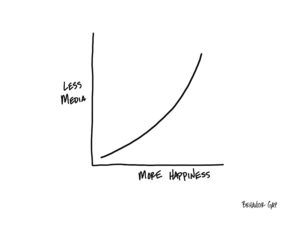Details Are Part of Our Difference
David Booth on How to Choose an Advisor
20 Years. 20 Lessons. Still Taking the Long View.
Making the Short List: Citywire Highlights Our Research-Driven Approach
The Tax Law Changed. Our Approach Hasn’t.
What We’re Watching – Madoff Series
Bernard Madoff committed the largest financial scam in history. This, you know. You may not know the stunning details of how he did it and managed to get away with it for so many years. That’s why we recommend watching the new four-part docuseries on Netflix. It includes interviews with victims, investigators, and scenes from Madoff’s depositions.
Fifteen years since his 65 billion dollar Ponzi scheme unraveled, there have been several depictions of Madoff, but “Madoff: The Monster of Wall Street” offers new insights worthy of your time.
Try a Media Fast

What if, for one whole week, you did a media fast?
You know… like, don’t consume any media at all. No screens, no devices, don’t even pick up a newspaper.
No. Media. Period.
Is one week too long? Then scratch that… make it three days. THREE DAYS. That’s just a long weekend. You can do it, I promise.
Give it a shot. And when you do, pay close attention to your emotional state. How does it make you feel? Happy? Sad? Energized? Exhausted? All of the above? None? Something else? I don’t know how it will make you feel… though I have my suspicions.
When I’ve done media fasts, I find myself feeling calm. Really calm. And to me, that feels good. Really good.
Which makes me wonder… if taking a media fast makes me feel so good, why do I ever go back to it at all?
Warning: You may find yourself asking that same question…
2022 Investment Performance

It’s no secret that 2022 was challenging for both the stock and bond markets. Stocks ended the year down 18%*, while bonds were down 13%**. How did we do in 2022? Thanks to our compliance group, all we can say here is that our strategy of investing in low-cost, diversified strategies that tilt toward small, value, more profitable stocks meaningfully outperformed the S&P500 index in 2022.
As much as I would like to pat our firm on the back, you know our refrain: one year is essentially meaningless when it comes to investing. Due to the volatility and randomness of markets, any strategy can outperform or underperform in any given year. Our strategy certainly does not outperform every year and can even underperform several years in a row. To have real confidence in an investment strategy’s reliability, investors must look at how it performs over decades, not just years.
To see how we measure up over the long haul, we go back as far as we can, looking at the investments we recommended each year (and own ourselves) to see how our philosophy has held up over time. Our favorite chart compares the value of a hypothetical $1 invested in the year 2000 to 2022. Some of you may be familiar with Paul Harvey’s famous line regarding “the rest of the story.” Shoot me a note at zenz@hillinvestmentgroup.com for the details and the rest of the returns story. We can share how our recommended equity strategy has performed over time and the magnitude of the benefit of taking the long view.
If you have been a client for a while, you have likely seen the benefit of a long-term, evidence-based strategy show up in your portfolio. If you’re not a client, ask yourself why. Then pick up the phone and call us. You can schedule a call with me anytime here.

